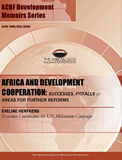
The publication contends that development assistance has been of benefit to developing countries over the years. It has helped to build physical infrastructural, human and institutional capacities and deliver some level of growth in recipient countries. Through civil society organizations, it has been instrumental in raising voices on the need for good governance, to stem the tide of corruption, and to promote development effectiveness of both aid and domestic resources. The Author also notes with the same fervor that development assistance has equally had its negative results list: traditional technical assistance has tended to supplant local capacity, undermine local knowledge and institutions and render recipient countries more vulnerable and dependent on aid. Reasons for these shortcomings are legion. Donor-driven projects are not derived from aid recipients' development priorities and are an expression of an attitude by donors that "they know better', "they lecture and recipients listen", "they give and poor countries receive", "they know and recipient countries learn", "they take care of things, because poor countries cannot."





